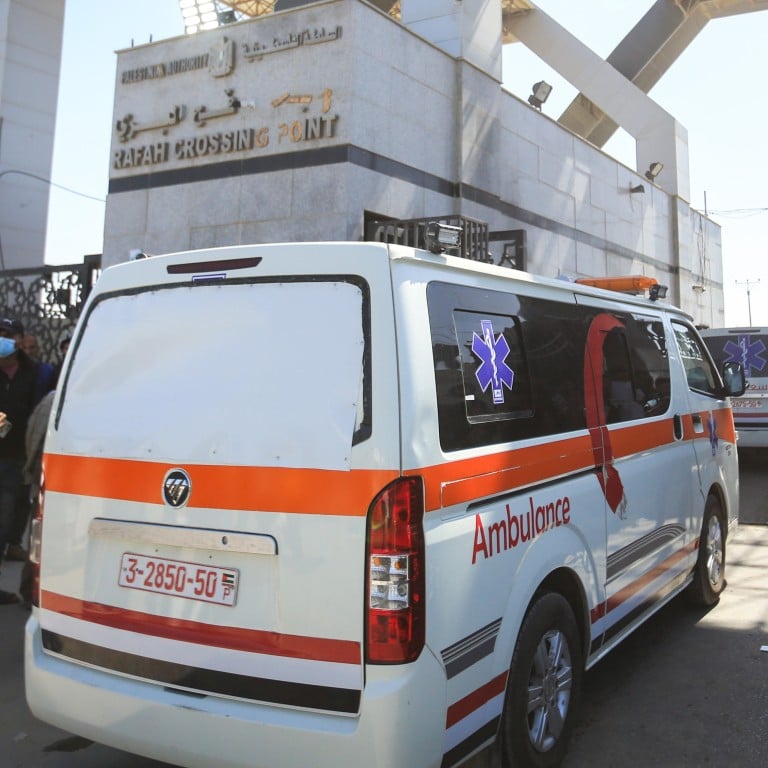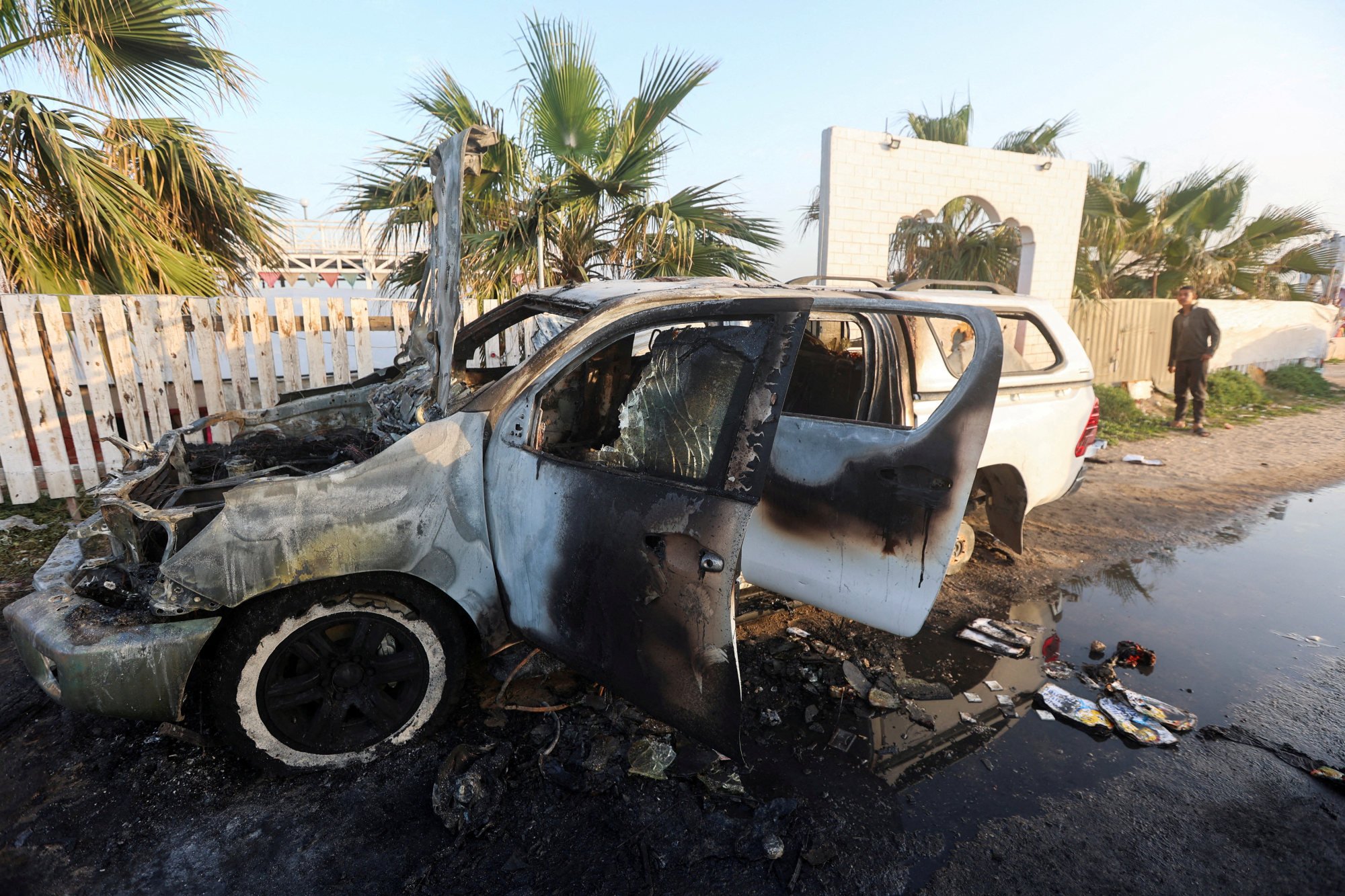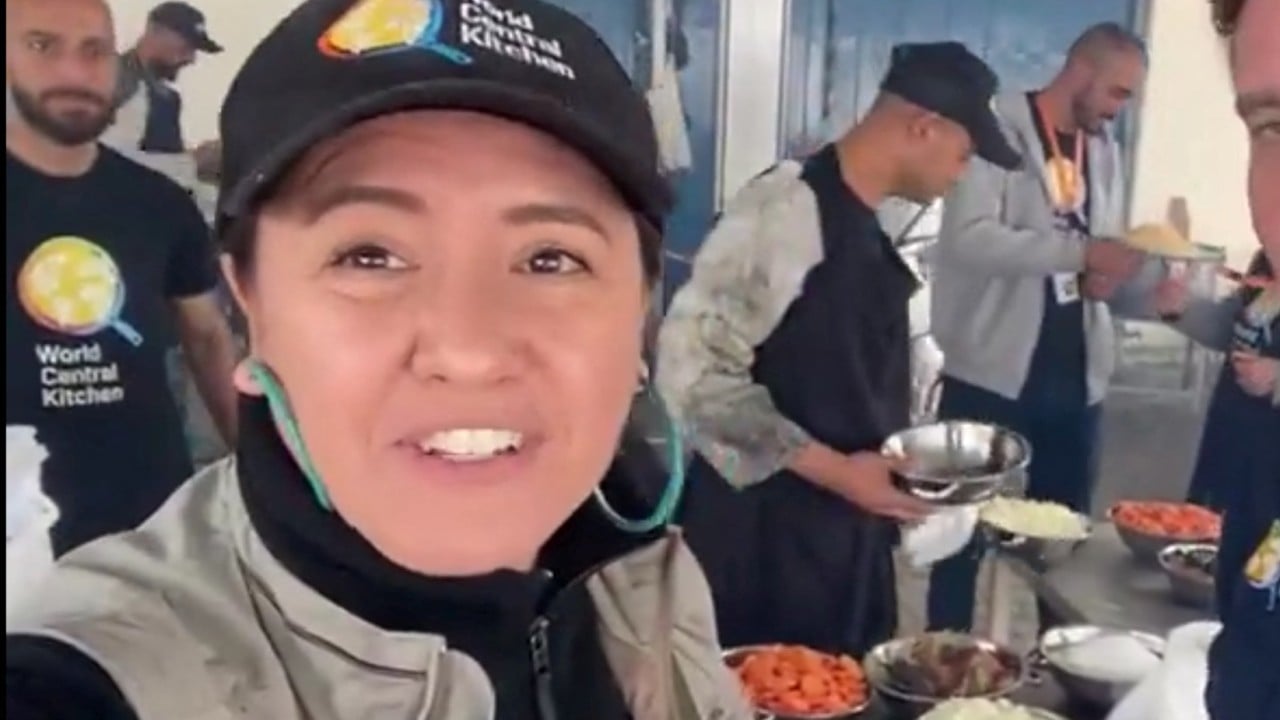
Bodies of foreign aid workers killed in Israeli strike taken out of Gaza
- The remains of 6 international staff from World Central Kitchen, who died alongside a Palestinian colleague, were taken to Egypt in ambulances
- The bodies were handed over to representatives from their respective countries after crossing the border at Rafah
The bodies of six foreign aid workers killed in an Israeli strike were on Wednesday taken out of Gaza to Egypt for repatriation, a security source said, as Israel faced a chorus of outrage over their deaths.
The Israeli military killed seven staff of the US-based food charity World Central Kitchen on Monday in an attack that UN chief Antonio Guterres labelled “unconscionable” and “an inevitable result of the way the war is being conducted”.
The remains of the six international staff, who were killed alongside one Palestinian colleague, were taken in ambulances to the Rafah crossing to Egypt, where they were handed over to representatives of their respective countries, the security source said on condition of anonymity.
Israel’s armed forces chief Herzi Halevi called the attack a “grave mistake”, which he blamed on nighttime “misidentification”, adding in a video message that “we are sorry for the unintentional harm to the members of WCK”.
Israeli Prime Minister Benjamin Netanyahu pledged the “tragic case” would be investigated “right to the end”, and President Isaac Herzog expressed his “deep sorrow and sincere apologies”.
The seven deaths piled more pressure on Israel, whose war since the Hamas attack of October 7 has brought devastation and mass civilian casualties to Gaza, where the UN warns the population of 2.4 million is on the brink of famine.
US President Joe Biden said he was “outraged and heartbroken” by the deaths and charged that Israel “has not done enough to protect aid workers trying to deliver desperately needed help to civilians”.
Australian Prime Minister Anthony Albanese said he had voiced his “anger and concern” to Netanyahu, while Britain summoned the Israeli ambassador and demanded “full accountability”.
How chef Jose Andres’ NGO staff are often first into disaster zones like Gaza
Polish Prime Minister Donald Tusk wrote on X to Netanyahu and Israel’s ambassador, saying the deaths were straining ties and that “the tragic attack against volunteers and your reaction are generating an understandable anger”.
Pope Francis also voiced “deep sorrow” and renewed his appeal for access to aid for the “exhausted and suffering civilian population” of Gaza, and for the release of the hostages taken by Hamas.
The charity said it was mourning the loss of its seven “heroes” and “beautiful souls”.
It said they had been killed in a “targeted attack” that was launched despite the group having coordinated its movements with Israeli forces.

It named those killed as Palestinian Saifeddin Issam Ayad Abutaha, 25; Australian Lalzawmi (Zomi) Frankcom, 43; Britons John Chapman, 57, James (Jim) Henderson, 33, and James Kirby, 47; Pole Damian Sobol, 35; and US-Canadian Jacob Flickinger, 33.
After their deaths, the charity suspended operations and a ship that had carried food aid from Cyprus to Gaza turned back towards the Mediterranean island with around 240 tonnes of supplies that had not been unloaded.
Jordan, to help ease the dire shortages in Gaza somewhat, said it had airdropped more food, joined by three US planes and one aircraft each from Egypt, Germany and the United Arab Emirates.
The bloodiest-ever Gaza war erupted with Hamas’s October 7 attack, which resulted in about 1,160 deaths in Israel, mostly civilians, according to an Agence France-Presse tally based on Israeli official figures.
‘Tanks went over bodies’: death and ruins at Gaza’s al-Shifa hospital
Israel’s retaliatory campaign has killed at least 32,975 people, mostly women and children, according to the health ministry in Hamas-run Gaza.
The army said its forces had “killed and apprehended a number of terrorists” in fighting near the Al-Amal Hospital in the southern city of Khan Younis, where they had also located numerous weapons.
Palestinian militants also seized around 250 hostages on October 7. Israel believes about 130 remain in Gaza, including 34 who are presumed dead.
Talks for a ceasefire and hostage release deal have stalled, with Hamas chief Ismail Haniyeh accusing Israel of procrastinating.

The families of the captives have staged four straight nights of mass protests, joined by a resurgent anti-government movement. Thousands gathered in front of parliament on Tuesday, with former prime minister Ehud Barak blaming Netanyahu for the October 7 “disaster” and demanding new elections.
The UN Human Rights Council will on Friday consider a draft resolution calling for an arms embargo on Israel, citing the “plausible risk of genocide in Gaza”.
The draft “condemns the use of explosive weapons with wide area effects by Israel in populated areas in Gaza” and of “the use of starvation of civilians as a method of warfare”.
There are 47 countries serving on the Human Rights Council – among them 18 states which brought forward the draft resolution. Twenty-four votes are needed for an outright majority, or possibly fewer if there are abstentions.
Israel has long accused the Human Rights Council of being biased against it.

.png?itok=arIb17P0)
